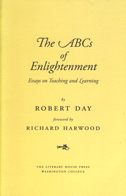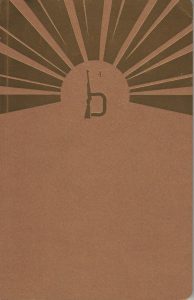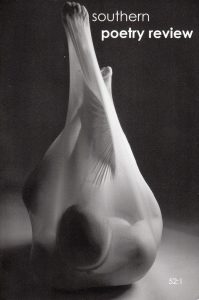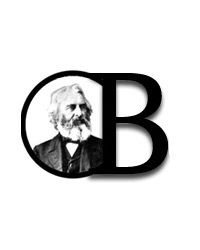The ABCs of Enlightenment
 I can only imagine Robert Day must have been (still is even after retirement 2007?) some sort of fixture at Washington College, and how lucky both must have been. I got a hold of his book, The ABCs of Enlightenment: Essays on Teaching and Learning after having mentioned a piece of his in a review of World Literature Today. Robert wrote to me: “No good deed goes unpunished” and had the book sent along with a corresponding poster of the ABCs. More on that later.
I can only imagine Robert Day must have been (still is even after retirement 2007?) some sort of fixture at Washington College, and how lucky both must have been. I got a hold of his book, The ABCs of Enlightenment: Essays on Teaching and Learning after having mentioned a piece of his in a review of World Literature Today. Robert wrote to me: “No good deed goes unpunished” and had the book sent along with a corresponding poster of the ABCs. More on that later.
The book itself is a slim volume, readable within a week’s worth of bus rides to campus. It’s simple but beautiful, having been produced by the Literary House Press of Washington College – part of the Rose O’Neill Literary House, both of which Robert is founder. The book is a collection of essays that had originally been commissioned by and appeared in print newspapers, and all are indeed expressions of enlightenment, as well as enlightening. It’s one of those kinds of books you read and feel your mind swirling off into another realm, the coming back down as the bus comes to your stop a bit unnerving, walking away still feeling a little floaty in thought.
The first essay, “Tales Out of School,” takes Day’s work with the press into perspective with his teaching. He recounts several different times and places, encounters that have stayed with him through these years, tales he tells interspersed with his work at the press with Mike Kaylor, then master printer. One of my favorite “tales” is an encounter he has with a young woman student who tells him she wants to be poet, but doesn’t “want to be influenced by poets.” She doesn’t read poetry, and doesn’t want to, but wants Day to read her poetry (in spiral bound notebooks). His advice to her ends with: “Go now. Write more poems. But show them to no one – not even me – lest I steal the purity of your vision. Be unique and stay by yourself. Very much by yourself.” It’s brilliantly funny, and bold, but is told to balance, or perhaps mask, a seemingly humiliating story he won’t tell, about the time he ‘badly advised’ Bob Shacochis. Each of the ‘tales’ is like this, a bit raw to read, but each a connection that can be made to those of us who have been in the teaching trenches and have those stories to tell, and those we won’t.
“Print It as It Stands – Beautifully,” is even more directly about Day’s work in the press and what it means to him both as a writer and a teacher. How different the press is vs. the computer screen. It was funny to read about how he works with students at the press, has them printing poetry broadsides which none of them then want to write on when they bring them to class to study and discuss the poetry. I felt exactly the same way in reading this volume, so many times wanting to pen notes in the margins, but something about the beauty of the pages stopped me every time. There is something fascinating and romantic about the workings of a letterpress, as Day explains: “The letterpress requires that you spend time with letters, with the type used to represent words, with the whole nine yards, as the students say. I wonder if it makes words worth more to the student who sets them in type than to the student who, like myself at this moment, flashes them onto a computer screen.”
Other essays in the collection include Day’s encounter with Allen Ginsberg who had come to Washington College to read: “Allen Ginsberg Levitates Chestertown” – in which Ginsberg leads a group of Ohm-chanting students and townspeople (complete with finger cymbals and guitar) to levitate the city jail. “Famous Education” considers the Sophie Kerr Prize – what happens to the “other half” of the money, and more over, whatever becomes of those who win – do they become famous?
The title essay, “The ABCs of Enlightenment” is an A-Z essay of commentary from Day’s decades of teaching. As he writes, if he were to give a talk to his opening freshman class that was “more of a general talk on how to get a generous education – not just from professors and classes, but from the college at large, and for yourself in particular,” it would be from his “alphabet of notes.” This particular essay was also reprinted in a poster form – from the Literary House Press. I was fortunate enough to receive this gorgeous work of art – and wish I could tell readers how to get a hold of one, but am not sure if they are still available. I’d say contact the press if you were interested. The alphabet is indeed enlightening as well as enjoyable to read, with plenty of cross referencing that is entertaining in itself. A couple letters to mention to give an idea of the scope of “advice”: Baseball, C (letter grade), Delphi, Emulation, French, “I don’t want to” (a message to young men), Nabokov, Phones, Strunk and White, X-ing, and Zeal. The book is worth seeking out just for this essay – not to mention the poster.
The book closes with “Parts of Their Night: An Elegy for Our Professors,” and is both profound and touching enough to have brought tears to my eyes at the close.
Whether through the book or by researching the original newspaper columns, these essays are very much worth seeking out and reading – for teachers, for writers, and just for those who enjoy thoughtful insight that enlightens without preaching – through honesty, humility, and humor.
Thank you Robert Day.




